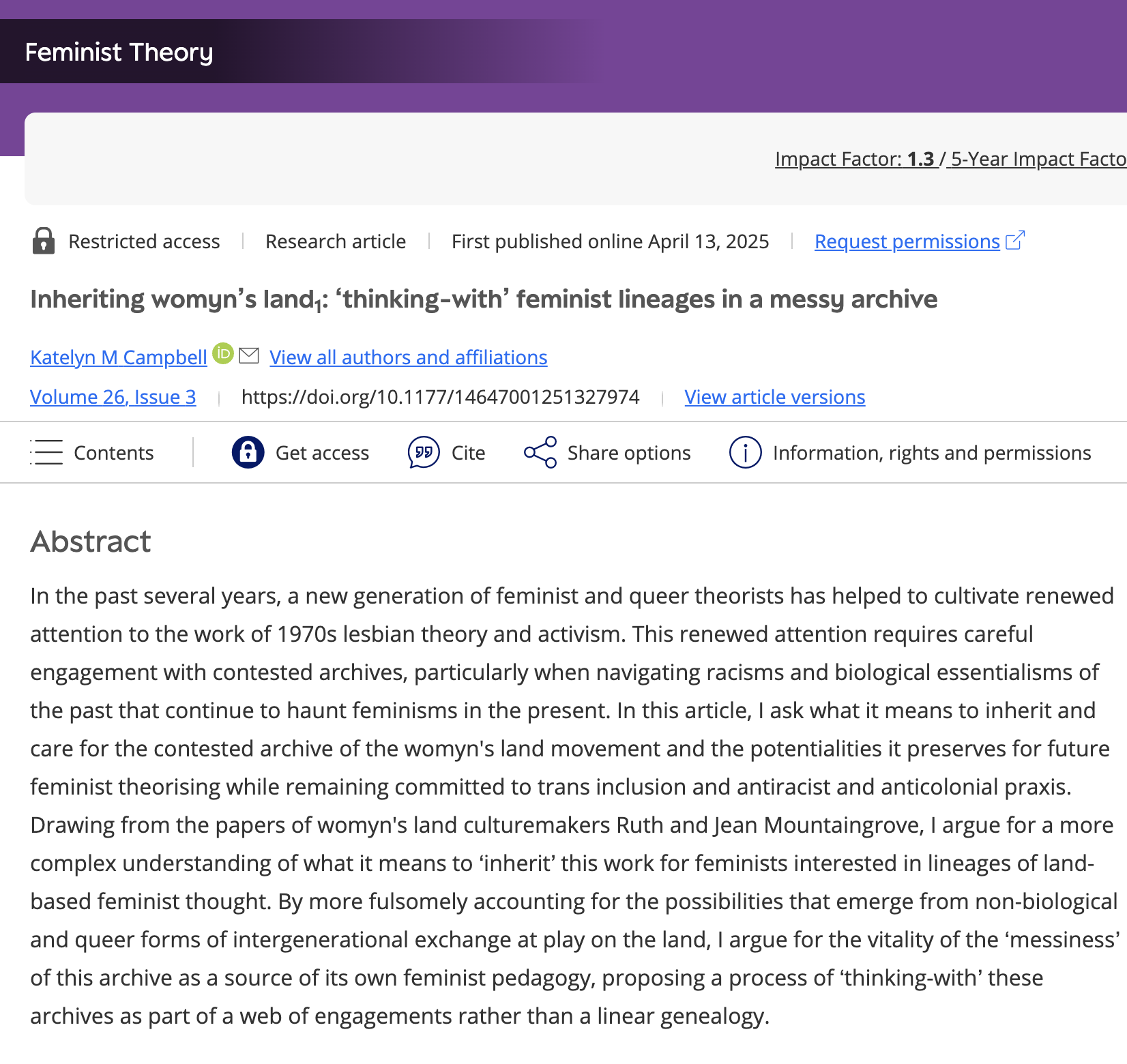Current Research
My research is broadly interested in the relationship between feminist theories articulated in the archive of the womyn’s land movement (broadly construed) and Black, Indigenous, and queer-feminist concepts of property, sovereignty, and solidarity. I am also interested in constructions of rurality and its temporalit(ies) as well as the aesthetic lives of radicalisms in the mid- to late-twentieth century.
Scholarly Publications
Inheriting Womyn’s Land: ‘Thinking-With’ Feminist Lineages in a Messy Archive
Feminist Theory Summer 2025 Special Issue on Intergenerational Feminisms. https://doi.org/10.1177/14647001251327974
This article reads an archive of recently-digitized home movies from Rootworks — a womyn’s land community in Josephine County, Oregon — alongside scholarship from Queer and Trans Studies, arguing for a methodological intervention in feminist thought and practice that centers nonlinear modes of inheritance as a way of understanding how to engage with troubled feminist lineages.
Forthcoming | Out on Rural Lands: Country Queer Dis/Orientation and the Potentialities of Loneliness
Accepted and in press with QED: A Journal of Queer Worldmaking.
In this article, I read Radclyffe Hall’s early lesbian novel The Well of Loneliness (1928) as a rural text. Drawing from growing academic and non-academic discourse around the relationship between queerness and rurality, I argue for the importance of understanding the more-than-human world as a constitutive element of country queer self-identification and orientation.
The Women Activists Found Little Peace at Bucolic School”: Utopian Dreams, Radical Feminist Nightmares, and the Pedagogical Potential of Sagaris
Editor-reviewed chapter in Utopian Imaginings: Saving the Future in the Present, edited by Victoria Wolcott. SUNY Press, 2024. Open Access Link.
In summer 1975, a group of some of the United States’s most famous radical feminists gathered in rural Vermont for the inaugural Sagaris Institute. Intended to serve as a university and training ground for the next wave of feminist revolution, the Institute instead ended in division, falling apart by summer’s end. This essay explores some of the quietly-kept history of Sagaris, arguing for the potentialities that remain in the archive of its failure.
Dear Toni Morrison: On Black Girls as Makers of Theories and Worlds
With Lauryn Dupree and Lucía Mock Muñoz de Luna for Black Schoolgirls in Space: Stories of Black Girlhoods Gathered on Educational Terrain, edited by Esther Ohito and Lucía Mock Muñoz de Luna. Bergahn Books, 2024. Link to purchase (and read open access!) here.
My contribution to this co-authored epistolary response to Toni Morrison’s The Bluest Eye (subtitled ‘How Much is a Little Girl Worth?” Toni Morrison’s The Bluest Eye and a Politics Against White Epistemologies of Ignorance’) began in a graduate seminar on Black Girlhood Studies. In my letter to Toni Morrison, I speak to the silences girls who are survivors of childhood sexual abuse (and their families) are expected to keep and how they function as a grammar of what Charles Mills has termed “white epistemologies of ignorance.”



